The IT staffing industry is experiencing a period of profound transformation. As technology advances and business needs evolve, both employers and job seekers must navigate a changing landscape to stay competitive. In this blog, we delve into the key trends shaping the future of IT staffing and explore how they will impact the workforce.
1. Embracing AI and Automation
Artificial Intelligence (AI) and automation are revolutionizing the way staffing agencies operate. From automating routine tasks such as resume screening to using AI-driven tools for matching candidates with job requirements, these technologies are enhancing efficiency and accuracy in the recruitment process. Employers can benefit from faster hiring times and more precise candidate matches, while candidates can enjoy a streamlined application experience.
Key Takeaway: AI and automation are streamlining staffing processes, offering quicker and more accurate candidate placements.
2. The Rise of Remote Work
Remote work has become a prominent trend, accelerated by the global pandemic. IT roles are particularly well-suited for remote arrangements, allowing companies to access a broader talent pool and offering employees greater flexibility. As remote work continues to gain traction, companies need to adapt their staffing strategies to support remote teams effectively, including investing in the right tools and maintaining a strong virtual company culture.
Key Takeaway: Remote work is reshaping the IT staffing landscape, requiring adaptations in both recruitment strategies and workplace management.
3. Increased Focus on Soft Skills
While technical skills remain crucial, employers are placing greater emphasis on soft skills such as communication, problem-solving, and adaptability. As technology becomes more integrated into business operations, the ability to work collaboratively and manage projects effectively is increasingly valued. Staffing agencies are now incorporating assessments for these skills into their recruitment processes to ensure a well-rounded candidate fit.
Key Takeaway: Soft skills are becoming as important as technical expertise, influencing hiring decisions and candidate evaluations.
4. Demand for Specialized Talent
The rapid pace of technological advancement has created a demand for highly specialized IT talent. Skills in areas such as cybersecurity, data science, and cloud computing are in high demand, and employers are seeking candidates with niche expertise. Staffing agencies must stay current with industry trends and emerging technologies to effectively identify and place specialized professionals.
Key Takeaway: The growing need for specialized IT skills requires staffing agencies to stay updated on industry trends and emerging technologies.
5. The Gig Economy and Freelance Opportunities
The gig economy is expanding, with more IT professionals opting for freelance or contract work. This shift offers flexibility and the opportunity to work on diverse projects, but it also presents challenges in terms of job stability and benefits. Staffing agencies are adapting by offering support for freelancers and contractors, including contract management and benefits solutions.
Key Takeaway: The rise of the gig economy is influencing IT staffing, with more focus on freelance and contract work, necessitating new support structures.
6. Emphasis on Diversity and Inclusion
Diversity and inclusion have become central to recruitment strategies. Organizations are increasingly focused on building diverse teams and creating inclusive work environments. Staffing agencies play a crucial role in helping companies achieve these goals by actively sourcing candidates from varied backgrounds and promoting unbiased hiring practices.
Key Takeaway: A strong emphasis on diversity and inclusion is driving changes in recruitment practices, with staffing agencies supporting more equitable hiring processes.
7. Evolving Candidate Expectations
Today’s candidates have higher expectations regarding job satisfaction, work-life balance, and company culture. Employers must address these expectations to attract and retain top talent. Staffing agencies are helping by providing insights into candidate preferences and assisting companies in creating compelling value propositions.
Key Takeaway: Understanding and meeting evolving candidate expectations is essential for attracting and retaining top IT talent.
8. Data-Driven Recruitment
Data analytics is increasingly being used to inform recruitment strategies. By analyzing data on candidate sourcing, hiring metrics, and employee performance, staffing agencies can make more informed decisions and optimize their processes. This data-driven approach helps improve recruitment outcomes and aligns hiring practices with organizational goals.
Key Takeaway: Data-driven recruitment is enhancing decision-making and process optimization, leading to better hiring outcomes.
Conclusion
The future of IT staffing is being shaped by a range of trends that are transforming the industry. Embracing these changes and adapting to new realities will be crucial for both employers and job seekers. By staying informed about emerging trends and leveraging new technologies, staffing agencies and organizations can navigate the evolving landscape and thrive in the competitive IT market.
Stay tuned to our blog for more insights and updates on the ever-changing world of IT staffing.
